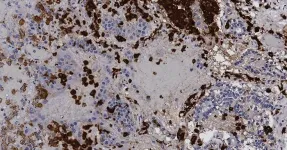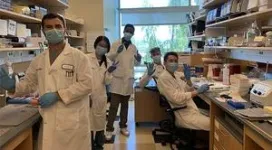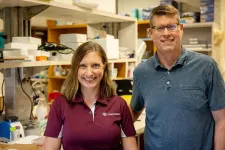(Press-News.org) Twelve years ago, cancer researchers at University of California San Diego identified a molecule that helps cancer cells survive by shuttling damaging inflammatory cells into tumor tissue. In new research, they show that the same molecule does the same thing in lung tissue infected with COVID-19 — and that the molecule can be suppressed with a repurposed cancer drug. The work, published in Science Translational Medicine, represents a new approach to preventing irreversible organ damage in infectious diseases like COVID-19 and methicillin-resistant Staphylococcus aureus (MRSA).
The two key players in this scenario are inflammatory cells called myeloid cells, and an enzyme called PI3K gamma (phosphatidylinositol 3,4,5-kinase gamma). Myeloid cells belong to our innate immune system — the immunity we’re born with before we’re exposed to pathogens in the environment — and work very quickly to kill deadly agents like SARS-CoV-2, the virus that causes COVID-19.
“Our work shows that drugs that can prevent the recruitment of damaging myeloid cells into tissues that are infected with severe agents like COVID-19 or MRSA have a significant benefit in preserving tissue function if given early enough in an infection,” says Judith Varner, Ph.D., professor in the Departments of Pathology and Medicine at UC San Diego School of Medicine, co-leader of the Solid Tumor Therapeutics program at UC San Diego Moores Cancer Center, and the study’s senior author.
Most other COVID-19 drugs target the virus, either preventing infection in the first place or preventing the virus from making more of itself after infection. The current approach targets the host, keeping the immune system from overreacting or fibers building up in the lungs.
Myeloid cells protect us, but they can also do a lot of damage, says Varner. “If you have a little infection, myeloid cells come in, kill bacteria, release alerts that recruit even more potent killer immune cells, and produce substances that can heal the damage. But if you get an infection that's too strong, you get overproduction of these alert signals, and the substances they release to kill these infective agents can also kill yourself. That's what happens in COVID-19.”
PI3K gamma promotes the movement of myeloid cells into cancerous tissues, as found in the team’s work with cancer twelve years ago. In the current work, they show that PI3K gamma also helps move myeloid cells into tissues infected with SARS-CoV-2. That led them to reason that a cancer drug that inhibits PI3K gamma, called eganelisib, might be effective in suppressing inflammation in COVID-19 by suppressing PI3K gamma’s ability to move myeloid cells into infected tissue.
Using a combination of bulk RNA sequencing and bioinformatics, the scientists analyzed tissues from humans and mice to see how SARS-CoV-2 changed the cellular and molecular makeup of infected tissues. They then treated the tissue with eganelisib to see if suppressing PI3K gamma made a difference. “We sequenced COVID-19 patient lung tissue and showed that when patients have COVID-19, a lot of their lung cells are killed and there's a huge increase in myeloid cells. We also found the same thing in infected mice,” said Varner. “When we treated with the drug, we showed that eganelisib prevents entry of myeloid cells into tissue so they can’t do all that damage. Further studies will determine if it can actually reverse damage.” The team also had the same results in mice infected with MRSA.
No similar approach has yet been approved for clinical use. “Other drugs were tested early during the COVID-19 crisis for similar effects, with only modest success. Our work is significant because this is the first time this particular approach of targeting the myeloid cells specifically has been shown to be effective in COVID,” said Varner.
The FDA fast-tracked eganelisib for development in 2020, but it has not yet been approved by the FDA. Varner hopes that publication of this work will inspire drug manufacturers to consider making other PI3Kgamma inhibitors to treat infectious diseases like COVID-19 and MRSA. but she’s also collaborating with the infectious disease experts who worked on this paper. “We hope that this research will help us obtain funding to continue investigating this approach in other disease settings,” she said.
This study was supported by National Institutes of Health grants (R01CA226909, R01CA167426, and R01DE027325 to J.A.V. and R01CA226909 subaward to L.C.M. and R01AI176554 to V.N.); the California Office of the President Emergency COVID-19 Research Seed Funding (R00RG2398 to J.A.V.); the Cowlin Family Foundation (to S.P.P.); Fast Grants, Emergent Ventures, Mercatus Center at George Mason University (to A.J.M.); and Cancer Research Institute/Irvington postdoctoral fellowships (to J.Z. and A.G.). This work was also supported by NIH UL1TR001442 and NIH S10 OD026929 to the UCSD Center for Computational Biology & Bioinformatics Shared Resource and Genomics Center), by NIH P30CA23100 to UCSD Moores Comprehensive Cancer Center, and Department of Health and Human Services Contract HHSN272201700041I/75N93021F00002 to J.D.M.
Co-authors include: Ryan M. Shepard, Anghesom Ghebremedhin, Jingjing Hu, Roman Sasik, Kathleen M. Fisch, Hui Chen, Marc Paradise, Jason Rivera, Mohammad Amjad, Satoshi Uchiyama, Hideya Seo, Soumita Das, Farnaz Hasteh, Hana Russo, Xin Sun, Le Xu, Laura Crotty E.Alexander, Jason M. Duran, Mazen Odish, Victor Pretorius, Alejandro D. Campos, Shao-ming Chin, Tami Von Schalscha, David Cheresh, Sandip P. Patel, and Victor Nizet of the University of California San Diego; Isaraphorn Pratumchai, Jaroslav Zak, and John R. Teijaro of Scripps Research Institute; Sally R. Robinson, Denise Ann Dayao, Saul Tzipori, Cesar Piedra-Mora, and Amanda J. Martinot of Tufts University; Courtney Betts, Nell C. Kirchberger, and Lisa M. Coussens of Oregon Health & Science University; John D. Morrey of Utah State University; Rossitza Alargova, Brenda O’Connell, and Theodore A. Martinot of Infinity Pharmaceuticals.
# # #
END
Fighting COVID-19 with a cancer drug
2024-07-03
ELSE PRESS RELEASES FROM THIS DATE:
From ‘hit to vial’: Discovery and optimization of a promising vaccine adjuvant
2024-07-03
Many vaccines are only partially effective, have waning efficacy, or do not work well in the very young or the very old. For more than a decade, Ofer Levy, MD, PhD, and David Dowling, PhD, in the Precision Vaccines Program at Boston Children’s Hospital, have tried improving vaccines by adding compounds known as adjuvants to boost vaccine recipients’ immune responses.
Now, under a large Adjuvant Discovery Program contract from the National Institute of Allergy and Infectious Diseases ...
Why do you keep your house so cold? Science says: Ask your parents
2024-07-03
Childhood home temperature and community connectedness can help predict how U.S. residents set their thermostats, offering new ways to encourage energy conservation and combat climate change, according to a study published July 3 in the open-access journal PLOS Climate by Dritjon Gruda from the National University of Ireland Maynooth and Paul Hanges from the University of Maryland.
Half of U.S. households’ annual electricity use goes to heating and cooling, but less than half of homeowners tweak their thermostats to save energy ...
Texas A&M center receives $7.6 million grant to promote research in environmental health
2024-07-03
The Texas A&M Center for Environmental Health (TiCER), a National Institute of Environmental Health Sciences (NIEHS) Environmental Health Sciences Core Center, will be returning to the Texas A&M School of Veterinary Medicine and Biomedical Sciences (VMBS) with a $7.6 million grant for the center’s new funding cycle.
Under the new leadership of Dr. Weston Porter, a VMBS professor in the Department of Veterinary Physiology and Pharmacology, the center will promote research in four areas of environmental health — climate ...
Deep machine-learning speeds assessment of fruit fly heart aging and disease, a model for human disease
2024-07-03
BIRMINGHAM, Ala. – Drosophila — commonly known as fruit flies — are a valuable model for human heart pathophysiology, including cardiac aging and cardiomyopathy. However, a choke point in evaluating fruit fly hearts is the need for human intervention to measure the heart at moments of its largest expansion or its greatest contraction, measurements that allow calculations of cardiac dynamics.
Researchers at the University of Alabama at Birmingham now show a way to significantly cut the time needed ...
U.S. Department of Energy issues request for proposals for contractor to manage and operate Thomas Jefferson National Accelerator Facility
2024-07-03
Today, the U.S. Department of Energy (DOE) announced the issuance of a Request for Proposals (RFPs) for the competitive selection of a management and operating contractor for the Thomas Jefferson National Accelerator Facility (TJNAF).
TJNAF is a DOE national laboratory and DOE-sponsored Federally Funded Research and Development Center that has a mission focused on delivering breakthrough science and technology in nuclear physics.
DOE expects to award the contract before the current agreement with Jefferson Science Associates, LLC expires on May 31, 2025, allowing for an anticipated three-month transition. DOE expects the selected ...
Survivorship standards help address the distinct needs of adult cancer survivors
2024-07-03
Key Takeaways
More people are surviving cancer than ever before and living longer. This growing population of adult cancer survivors requires distinct survivorship services focused on long-term well-being.
Survey study demonstrates the value of American College of Surgeons’ survivorship accreditation standards, though specialized services in fertility and sexual health are less accessible.
CHICAGO — With the number of adult cancer survivors in the United States expected to reach 23 million by 2032,* the long-term needs of this ...
Mighty floods of the Nile River during warmer and wetter climates
2024-07-03
Summary
Global warming as well as recent droughts and floods threaten large populations along the Nile Valley. Understanding how such a large river will respond to an invigorated hydrological cycle is therefore a pressing issue. Insights can be gained by studying past periods with wetter and warmer conditions, such as the North African Humid Period eleven to six thousand years ago. A research team of the German Research Centre for Geosciences GFZ, led by Cécile Blanchet, together with colleagues ...
Popular prescription weight loss drugs linked to uncommon blinding condition
2024-07-03
A new study led by investigators from Mass Eye and Ear found that patients prescribed semaglutide (as Ozempic or Wegovy) for diabetes or weight loss had a higher risk of having a potentially blinding eye condition called NAION than similar patients who had not been prescribed these drugs.
Notably, the study found people with diabetes who had been prescribed semaglutide by their physician and then filled the prescription were more than four times more likely to be diagnosed with NAION. Those who were overweight or had obesity and prescribed this drug were more than seven times more likely to get the diagnosis.
The study, which ...
COVID-19 vaccination and parent-reported symptomatic child asthma prevalence
2024-07-03
About The Study: Researchers found that higher COVID-19 vaccination rates may confer protection against symptomatic asthma in children. COVID-19 vaccination yields prophylactic benefits against SARS-CoV-2 infection for individual children and may also protect against other human coronaviruses through cross-reactive antibody responses.
Corresponding Author: To contact the corresponding author, Matthew M. Davis, M.D., M.A.P.P., email matthew.davis@nemours.org.
To access the embargoed study: Visit our For The Media website at this link https://media.jamanetwork.com/
(doi:10.1001/jamanetworkopen.2024.19979)
Editor’s ...
Experimental drug supercharges medicine that reverses opioid overdose
2024-07-03
The ongoing opioid epidemic in the U.S. kills tens of thousands of people every year. Naloxone, sold under the brand name Narcan, has saved countless lives by reversing opioid overdoses. But new and more powerful opioids keep appearing, and first responders are finding it increasingly difficult to revive people who overdose.
Now, researchers have found an approach that could extend naloxone’s lifesaving power, even in the face of ever-more-dangerous opioids. A team of researchers from Washington University School of Medicine in St. Louis, Stanford University and the University of Florida have identified potential ...





